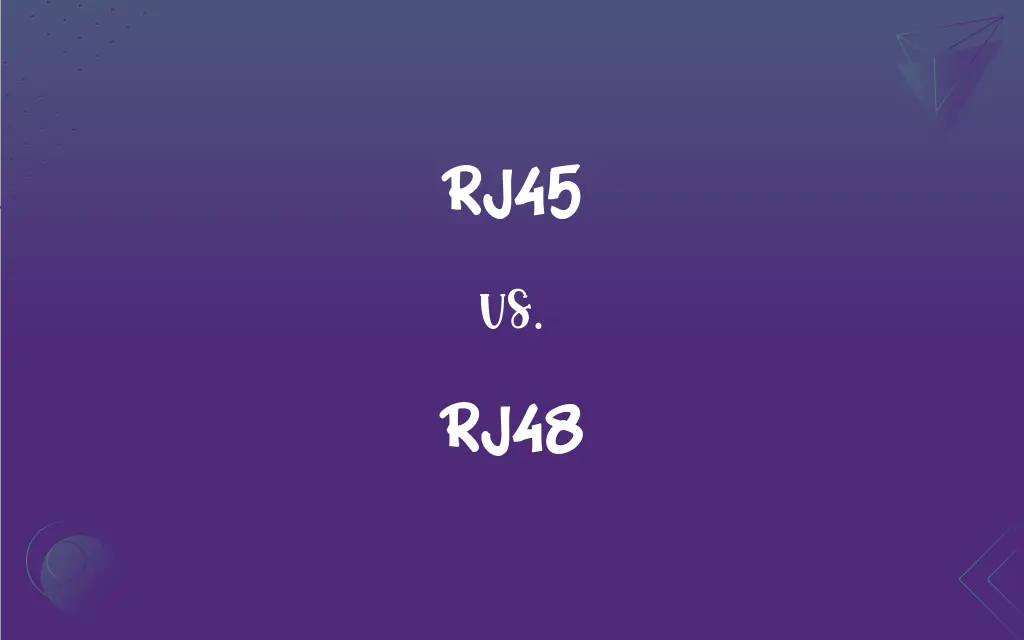RJ45 vs. RJ48: What's the Difference?
Edited by Aimie Carlson || By Janet White || Published on February 12, 2024
RJ45 is a standard type of connector used mainly for Ethernet networking, while RJ48 is a similar connector used primarily for T1 and ISDN network connections.

Key Differences
RJ45 connectors are widely recognized in the world of computer networking, primarily used for Ethernet connections. They are typically used to connect computers, routers, and switches in a local area network (LAN). RJ48 connectors, while similar in appearance to RJ45, are designed for telecommunications applications, such as T1 and ISDN lines. These connectors are used to provide more robust and secure connections in these environments.
The physical appearance of RJ45 and RJ48 connectors is quite similar, both being 8-pin connectors. However, the key difference lies in their wiring schemes and intended usage. RJ45 connectors are typically wired for Ethernet networking standards such as 10BASE-T and 100BASE-TX. RJ48 connectors, on the other hand, have a different wiring configuration, making them suitable for T1 lines, which require more stringent specifications for signal integrity.
In terms of application, RJ45 connectors are most commonly found in office and home network environments. They are a staple in connecting various Ethernet-compatible devices. RJ48 connectors are more specialized, used in business and carrier networks where T1 lines are prevalent. Their usage is more common in professional settings where dedicated data and voice transmission lines are necessary.
Another difference lies in the level of shielding and protection offered by each connector. RJ48 connectors typically have more robust shielding to protect against electromagnetic interference, which is crucial for the high-quality voice and data transmission required in T1 and ISDN lines. RJ45 connectors, while they can also be shielded, do not necessarily require the same level of protection as they are used in less demanding environments.
RJ45 is almost synonymous with Ethernet networking, RJ48 is less commonly known due to its specific use in telecommunications. The knowledge and use of RJ48 connectors are more niche, required primarily by professionals working with dedicated telecommunication circuits.
ADVERTISEMENT
Comparison Chart
Primary Use
Ethernet networking
T1 and ISDN networks
Wiring Scheme
Standard Ethernet configurations
Specific configurations for T1/ISDN
Common Environment
Home and office LANs
Business and carrier networks
Shielding
Variable, often less robust
More robust for interference protection
Connector Type
8-pin connector
Similar 8-pin connector, different wiring
ADVERTISEMENT
RJ45 and RJ48 Definitions
RJ45
Connector for Cat5 and Cat6 cables.
Ensure the RJ45 connectors are crimped properly on the Cat6 cable.
RJ48
Used in professional telecommunications.
RJ48 jacks are installed in the telecom room for dedicated lines.
RJ45
A connector for Ethernet and network cables.
Connect the RJ45 plug to the router for internet access.
RJ48
Similar to RJ45 but with different wiring.
Despite looking like RJ45, RJ48 connectors have a distinct wiring scheme.
RJ45
Integral to Ethernet networking.
RJ45 jacks are essential for setting up a home network.
RJ48
Offers enhanced shielding for signal integrity.
Choose RJ48 connectors for better protection against interference.
RJ45
Standard for wired network connections.
RJ45 ports are common on most computers and network devices.
RJ48
Connector used for T1 and ISDN lines.
The T1 line requires an RJ48 connector for proper connection.
RJ45
Used in LAN cabling systems.
We used RJ45 connectors to wire the office network.
RJ48
Specific to high-quality voice/data transmission.
For our ISDN setup, we need RJ48 connectors.
FAQs
Are RJ45 and RJ48 connectors physically different?
They look similar but have different wiring configurations.
Can you use an RJ45 connector for a T1 line?
No, RJ48 connectors are specifically designed for T1 lines.
What is an RJ48 connector?
A connector primarily used for T1 and ISDN network connections.
How do RJ45 and RJ48 differ in usage?
RJ45 is used for Ethernet, while RJ48 is for T1 and ISDN lines.
What is an RJ45 connector?
A connector used mainly for Ethernet networking.
Why is shielding important for RJ48?
It protects against electromagnetic interference for clear signal transmission.
What are the key differences in wiring between RJ45 and RJ48?
RJ48 has a specific wiring scheme for T1/ISDN, different from RJ45's Ethernet wiring.
Can I use RJ48 for my home network?
It's not typical unless you have a T1 or ISDN line at home.
What kind of cable is used with RJ45 connectors?
Cat5, Cat5e, Cat6, and Cat6a cables.
Where is RJ48 typically used?
In business environments with T1 or ISDN lines.
Are RJ45 connectors used in data centers?
Yes, they're standard for network connections in data centers.
What devices have RJ45 ports?
Routers, switches, computers, and various network devices.
What devices use RJ48 connectors?
Devices involved in T1 or ISDN network connections, like T1 CSUs/DSUs.
Why are RJ45 connectors so common?
Due to their widespread use in Ethernet networking, a standard in most LANs.
What type of cable is used with RJ48 connectors?
Typically, shielded twisted pair cables for T1 lines.
Is RJ45 compatible with all Ethernet speeds?
Yes, RJ45 supports various Ethernet speeds, including Gigabit Ethernet.
Where are RJ45 connectors commonly used?
In home and office local area networks.
Can RJ45 and RJ48 connectors be used interchangeably?
Not recommended, as they serve different purposes and have different wiring.
Do RJ45 connectors need special tools for installation?
Yes, a crimping tool is needed for attaching RJ45 connectors to cables.
Do RJ48 connectors require a professional to install?
Usually, due to their specific use in telecommunications.
About Author
Written by
Janet WhiteJanet White has been an esteemed writer and blogger for Difference Wiki. Holding a Master's degree in Science and Medical Journalism from the prestigious Boston University, she has consistently demonstrated her expertise and passion for her field. When she's not immersed in her work, Janet relishes her time exercising, delving into a good book, and cherishing moments with friends and family.
Edited by
Aimie CarlsonAimie Carlson, holding a master's degree in English literature, is a fervent English language enthusiast. She lends her writing talents to Difference Wiki, a prominent website that specializes in comparisons, offering readers insightful analyses that both captivate and inform.







































































